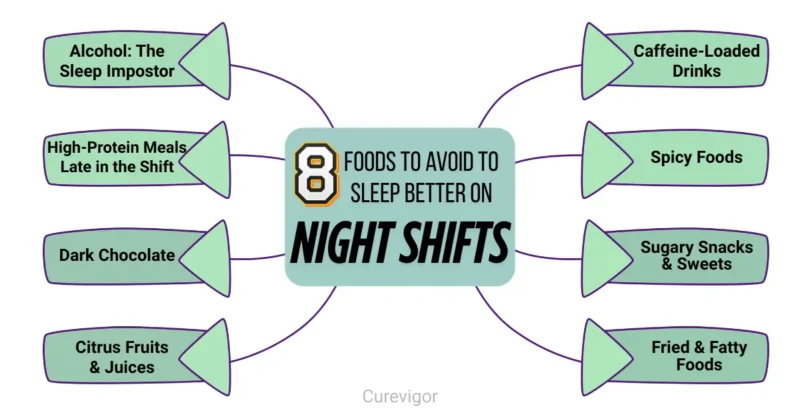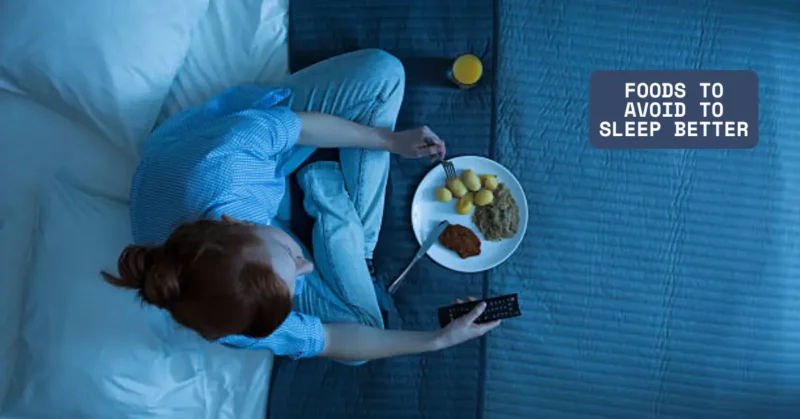Tossing and turning after your shift? Discover eight foods to avoid to sleep better on night shifts—and what to eat instead for deeper, uninterrupted rest.
Thank you for reading this post, don't forget to subscribe!Working the night shift is hard enough, but sleeping afterward is even harder. Even harder. What if the secret to better rest isn’t just blackout curtains or white noise, but what’s on your plate?
From late-night caffeine to deceptively “healthy” snacks, your food choices may be sabotaging your sleep without you even realizing it. In this post, we uncover the top foods to avoid to sleep better on night shifts—so you can fall asleep faster, stay asleep longer, and wake up feeling rested.
Tired After Night Shifts? Foods to Avoid to Sleep Better
If you work night shifts, you already face a disrupted circadian rhythm. But did you know that the foods you eat could be the most significant hidden reason you’re tossing and turning after your shift ends? While blackout curtains and melatonin help, they won’t make up for a poor diet filled with sleep-disrupting foods. Nutrition is one of the most overlooked tools for improving sleep quality, especially for shift workers.
This guide reveals eight foods to avoid for better sleep after night shifts. Backed by research and sleep science, these common culprits can increase alertness, cause digestive distress, and interfere with your natural wind-down at precisely the wrong time.

1. Caffeine-Loaded Drinks: The Most Obvious (Yet Often Overlooked) Sleep Disruptor
Caffeine is the go-to solution for night shift workers battling fatigue, but it’s also one of the biggest obstacles to getting quality sleep after work. Most people know caffeine keeps them alert, but few understand how long it lingers in the body. Caffeine works by blocking adenosine, a brain chemical that promotes drowsiness, which helps you stay awake, but makes winding down later extremely difficult.
The real issue isn’t just how much caffeine you consume but when you consume it. Caffeine has a half-life of five to six hours, meaning half of that 3 a.m. coffee is still in your system by 9 a.m.—just when you’re heading to bed. If you drink caffeine late in your shift, it may delay your ability to fall asleep, reduce sleep duration, and decrease time spent in deep, restorative stages of sleep.
For better post-shift rest, aim to cut off caffeine intake at least 4–6 hours before your intended bedtime. It allows your body time to metabolize the stimulant and transition into a sleep-ready state. Instead of reaching for that last coffee or energy drink near the end of your shift, opt for non-caffeinated options, such as herbal teas (e.g., peppermint or chamomile), infused water, or even warm lemon water, to hydrate without overstimulation.
Avoiding caffeine at the wrong time is one of the most straightforward but powerful dietary habits to help night shift workers sleep better—yet it’s often the first thing overlooked. Prioritize sleep by timing your caffeine wisely, and your energy levels will stabilize naturally over time.
2. Spicy Foods: A Surprising Culprit That Heats You When You Should Be Cooling Down
While spices may add excitement to your meals, they can wreak havoc on your sleep, especially if you’re eating right before heading to bed after a night shift. Spicy foods raise your core body temperature, which directly conflicts with your body’s natural sleep signals. To fall asleep, your body needs to cool down gradually. When you eat spicy food close to bedtime, you prolong alertness and stimulate your metabolism at the worst possible time.
But that’s not the only issue. Spicy meals can also lead to acid reflux, indigestion, and gastrointestinal discomfort, especially when lying down soon after eating. This is a common problem among shift workers who eat their last meal after 5 or 6 a.m. and try to sleep shortly afterward. These digestive disruptions can lead to frequent awakenings, poor sleep quality, and a reduction in time spent in REM sleep, which is crucial for cognitive recovery.
Studies have shown that people who consume a high-spice diet close to bedtime experience longer sleep latency (more time to fall asleep), less restful sleep, and more nighttime awakenings. Chili peppers, garlic-heavy meals, and dishes loaded with hot sauces or curry pastes are among the most common offenders.
If you want to sleep better after your shift, make your final meal simple, bland, and conducive to sleep. Choose ingredients that are easily digestible, such as steamed vegetables, brown rice, bananas, and lean protein like turkey or tofu. These won’t interfere with digestion or raise your body temperature, providing your system with the calm conditions it needs for deep sleep.
3. Sugary Snacks and Sweets: The Crash You Don’t Want
When exhaustion hits hard during a night shift, sugary foods can feel like the ultimate rescue—quick, cheap, and comforting. Donuts, pastries, soda, sweetened granola bars, and even “energy” snacks marketed as healthy are often the first things shift workers reach for during breaks. But these processed sugars come at a high cost to your post-shift sleep quality.
Consuming high-glycemic foods spikes your blood sugar rapidly, causing a short-lived boost in energy followed by a sharp crash. This rollercoaster can leave you feeling jittery, anxious, or drained—and these effects can bleed into your sleep window, even hours later. More importantly, sugar disrupts the body’s natural production of melatonin, the hormone responsible for helping you fall and stay asleep.
Studies show that diets high in refined sugar are associated with shorter sleep duration, more frequent nighttime awakenings, and lower sleep efficiency. If you’re consuming sugar-laden items in the second half of your shift—especially after 3–4 a.m.—you’re essentially telling your brain to stay alert right when it should be preparing for rest.
To promote better sleep after your shift, replace processed sugars with natural alternatives like:
- A banana with almond butter
- A small bowl of unsweetened Greek yogurt with berries
- Dates or figs paired with a handful of walnuts
These choices offer natural carbohydrates along with protein and healthy fats, which help maintain blood sugar stability, promote satiety, and support melatonin production rather than suppress it.
Making this simple dietary shift can dramatically improve your sleep latency (how long it takes to fall asleep) and help you wake up feeling more rested, not foggy or wired.

4. Fried and Fatty Foods: Heavy on the Stomach, Light on Sleep Quality
Greasy, fried foods may be comforting after a demanding shift, but they’re one of the most significant dietary culprits behind poor post-shift sleep. Fried chicken, French fries, fast food burgers, deep-fried snacks, or cheesy, high-fat comfort meals slow down the digestive process, making your body work harder—right when it should be slowing down for recovery.
High-fat meals can lead to indigestion, bloating, and acid reflux, especially when eaten close to bedtime. It is a critical issue for night shift workers who often eat their “dinner” just before heading to bed in the morning. The extra time your stomach and liver need to process these dense, greasy foods keeps your core body temperature elevated, interfering with the body’s natural drop in temperature required for deep sleep onset.
Beyond digestion, fatty foods also impact sleep architecture—the natural flow through various sleep stages. Research from the Journal of Clinical Sleep Medicine indicates that diets high in saturated fat are associated with reduced restorative slow-wave sleep, increased nighttime awakenings, and fatigue the following day, even when sleep duration appears adequate.
To avoid these disruptions, shift workers should opt for:
- Lean proteins like grilled chicken, turkey, tofu, or eggs
- Complex carbohydrates like quinoa, brown rice, or sweet potatoes
- Fiber-rich vegetables like broccoli, zucchini, or spinach
These choices are easier to digest, support better metabolic regulation, and contribute to a smoother transition into restful sleep. If you’re prepping meals ahead of your shift, focus on baking, grilling, steaming, or air-frying instead of deep-frying.
Avoiding fried and fatty foods isn’t about restriction—it’s about reclaiming the high-quality sleep your body needs to reset and recharge after challenging hours on the job.
5. Alcohol: The Sleep Impostor
After a long, demanding night shift, pouring a glass of wine or cracking open a beer can feel like a well-earned reward. The initial drowsiness alcohol creates might even fool you into thinking it’s helping you sleep. But sleep researchers agree: alcohol is one of the worst substances for quality rest, especially for shift workers already battling an out-of-sync circadian rhythm.
While alcohol acts as a depressant and helps you fall asleep faster, it disrupts the second half of your sleep cycle—particularly REM sleep, the phase essential for memory consolidation, emotional regulation, and mental clarity. The result? You wake up groggy, dehydrated, and cognitively impaired, even if you were asleep for 7–8 hours.
Furthermore, alcohol is a diuretic, increasing your need to urinate during sleep and causing more frequent awakenings. It also relaxes your throat muscles, worsening conditions like snoring and sleep apnea, which are already more common among night shift workers with inconsistent schedules.
If you’re trying to optimize recovery after a shift, it’s best to skip alcohol altogether in your post-shift routine. Instead, choose sleep-supporting drinks like:
- Tart cherry juice – naturally rich in melatonin and antioxidants
- Warm almond milk – provides magnesium and tryptophan.
- Chamomile tea – helps calm the nervous system without disrupting sleep stages.
These alternatives support your body’s natural sleep chemistry without sabotaging it, helping you sleep deeper and wake up truly rested—without the hangover effect.
6. High-Protein Meals Late in the Shift: When Too Much of a Good Thing Backfires
Protein is vital for muscle repair, energy, and hormone balance—especially for shift workers who often miss regular meal times. But eating a large, protein-heavy meal right before sleep can have unintended consequences on your ability to fall and stay asleep.
Protein takes longer to digest than carbohydrates or fats, which means it keeps your metabolism and internal temperature elevated for a more extended period. That’s great when you’re starting your shift—but not ideal when you’re winding down. A stimulated digestive system can interfere with the body’s natural signals for rest, delaying melatonin production and keeping you alert when you should be preparing for sleep.
Heavy protein meals—especially when combined with saturated fats, such as cheese, fatty cuts of meat, or creamy sauces—can also contribute to indigestion, sluggishness, or even acid reflux. These issues are compounded if you lie down shortly after eating, which is common after night shifts.
So, what’s the solution?
For better post-shift sleep:
- Choose light proteins such as eggs, Greek yogurt, tofu, or turkey breast
- Pair them with complex carbs like oatmeal, quinoa, or sweet potato.
- Eat this at least 60–90 minutes before your planned sleep time.
This combination promotes serotonin production, balances blood sugar levels, and allows your body to transition smoothly into a restful state. It’s not about cutting out protein—it’s about eating it smartly, especially when your sleep is already on a tight schedule.
7. Dark Chocolate: Sneaky Caffeine Source
That small square of dark chocolate you treat yourself to after a shift might feel harmless—or even healthy, given its antioxidant content. But if you’re struggling to sleep during daylight hours, dark chocolate could be a stealthy saboteur of your recovery. Why? Because it’s packed with both caffeine and theobromine—two compounds known to stimulate the nervous system and raise heart rate, keeping you alert long after your shift ends.
Dark chocolate, especially varieties with high cocoa content (70% or more), contains approximately 20–50 milligrams of caffeine per serving, which is comparable to the amount found in a cup of green tea. Combine that with theobromine, which acts similarly to caffeine but lasts longer in the system, and you’ve got a double hit of stimulation—not ideal when your body should be winding down.
Consuming dark chocolate within four hours of intended sleep time can lead to difficulty falling asleep, lighter sleep stages, and more awakenings—a recipe for fatigue when your body needs deep, restorative rest. This is especially problematic for night shift workers, whose sleep timing is already out of sync with natural circadian rhythms.
If you’re craving something sweet after a shift, skip the chocolate and reach for:
- A banana – rich in potassium and magnesium, which help relax muscles
- A kiwi – one of the few fruits shown in studies to improve sleep onset and duration
- A small bowl of chilled cherries – which naturally contain melatonin
These alternatives satisfy sweet cravings while supporting your body’s natural sleep cycle rather than disrupting it.
8. Citrus Fruits and Juices: Too Acidic to Wind Down With
Citrus fruits—like oranges, grapefruits, lemons, and even pineapple—are often seen as the epitome of healthy eating. And while they’re rich in vitamin C and antioxidants, they’re not ideal for sleep, especially when consumed right before bed after a long night shift.
The issue? High acidity. Citrus fruits can irritate the esophagus and trigger acid reflux or heartburn, particularly when eaten shortly before lying down. These digestive disturbances are far more than just uncomfortable—they can delay sleep onset, fragment your rest, and leave you feeling less refreshed, even if you’ve slept for hours.

Night shift workers are at increased risk for digestive issues and GERD (gastroesophageal reflux disease) because of irregular eating patterns and altered sleep-wake cycles. Introducing highly acidic fruits just before daytime rest adds unnecessary strain to the stomach, making it harder for the body to relax into sleep mode fully.
To prevent reflux and support better digestion before bed, swap citrus for low-acid, sleep-friendly fruits such as:
- Bananas – help coat the stomach lining and contain tryptophan
- Pears – low-acid and hydrating, gentle on the gut
- Cantaloupe or honeydew melon – soothing and high in sleep-promoting nutrients like magnesium
These fruits not only reduce the risk of acid-related sleep disturbances but also provide hydration and minerals that help calm the nervous system and prepare your body for deeper sleep.
FAQs on Foods to Avoid to Sleep Better on Night Shifts
Q. Which food is best for the night shift?
The best foods for night shift workers are balanced, energy-sustaining, and easy to digest. Meals should include complex carbohydrates, lean protein, and healthy fats to stabilize blood sugar and maintain focus. Good options include grilled chicken with brown rice, quinoa salads, boiled eggs with whole-grain toast, or veggie wraps with hummus. Light snacks, such as Greek yogurt or fruit with nuts, help prevent energy crashes. Avoid heavy or sugary meals that lead to sluggishness. Eating small portions every 3–4 hours also helps manage alertness without overloading the digestive system.
Q. Which food is best for sleeping at night?
Foods that naturally promote better sleep are rich in tryptophan, magnesium, and melatonin. Top choices include tart cherries, kiwi, bananas, almonds, oats, and warm milk or almond milk. These foods support the body’s natural sleep-wake cycle by enhancing melatonin production and muscle relaxation. A light snack that pairs protein and complex carbs (like turkey with whole-grain crackers) works well if eaten 1–2 hours before bed. Avoid caffeine, spicy dishes, and large meals too close to bedtime to maximize the benefits of sleep.
Q. Which foods decrease sleep?
Several foods can negatively impact your sleep, especially when eaten close to bedtime. These include caffeinated drinks, dark chocolate, spicy meals, fried or fatty foods, and high-sugar snacks. Such foods either overstimulate the nervous system, raise body temperature, or cause digestive discomfort—making it harder to fall asleep and stay asleep. Alcohol may initially feel sedating, but it disrupts REM sleep and causes early awakenings. To improve rest, limit these sleep-disrupting foods at least 3–4 hours before your intended bedtime.
Q. Which fruit should not be eaten at night?
Citrus fruits, such as oranges, grapefruits, and pineapples, are best avoided close to bedtime. Their high acidity can trigger acid reflux or heartburn, especially when lying down soon after eating. It can disrupt sleep and cause discomfort. While rich in vitamin C, citrus is more suitable for daytime consumption. Instead, choose low-acid fruits like bananas, pears, or kiwi, which support digestion and aid melatonin production. Timing also matters—any fruit eaten too close to sleep can cause minor blood sugar spikes, so keep late-night snacks light and bright.
Conclusion: Eat Smarter to Sleep Deeper After Night Shifts
When it comes to sleeping well after a night shift, your diet plays a bigger role than you might think. Choosing what not to eat can be just as important as what you do. By understanding the foods to avoid to sleep better—like caffeine, fried meals, alcohol, and acidic fruits—you give your body a real chance to wind down, recover, and recharge. These small, intentional food choices can help reduce sleep disruptions, promote deeper rest, and make you feel more refreshed upon waking. Remember, better sleep starts before your head hits the pillow—it begins on your plate.
Read more Health and Wellness Tips.
You might like:

